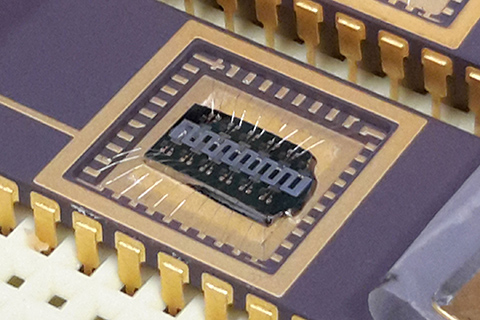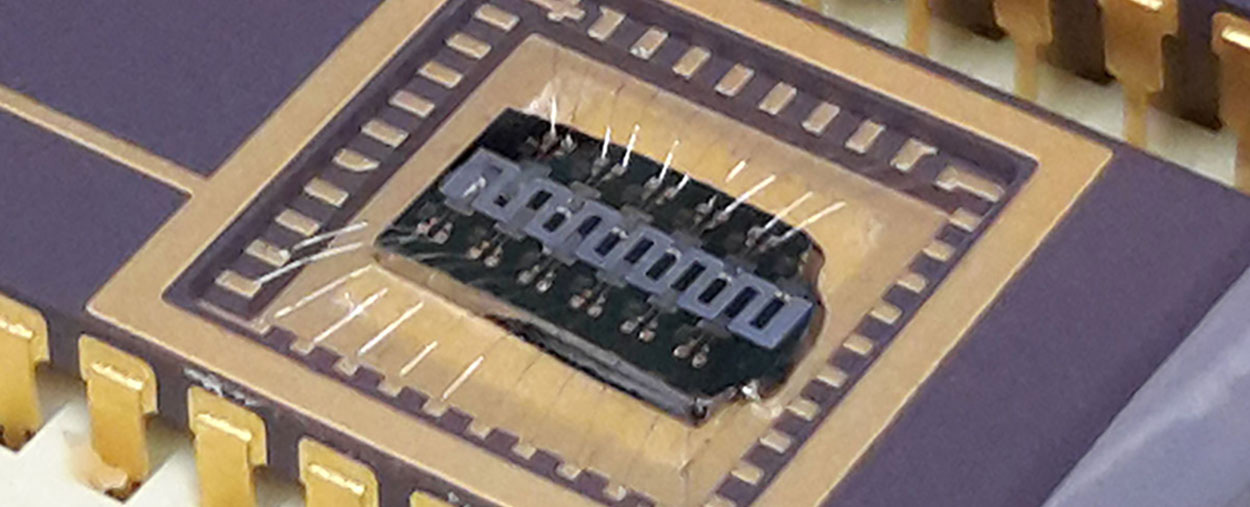2017-23, ECE 542/642: Undergraduate and Graduate level class. Introduction to the fundamentals of Microelectromechanical Systems (MEMS) through lectures on sensors, actuators, readout electronics, and noise. Based on design and analysis principles the course focuses on commercial applications such as acceloremeters, biochemical sensors, RF components, microfludics, and optical devices. Sensor electronics will be discussed with a focus on integration with Complementary Metal Oxide Semiconductor (CMOS) technology.
2010-23, ECE 532/632: Undergraduate and Graduate level class on VLSI Systems Design. Fundamentals of MOS Technology in VLSI with a focus on CMOS devices and deep-submicron technology. CMOS circuits and layout extending from gates and inverters to the design of large logic blocks. Interconnect modeling, power and clock distribution, area, power, and speed optimization. System level data and control flow structures, design, layout, mask making, fabrication, packaging and testing of VLSI chips. Experiments using Cadence ICFB Design suite.
2011-23, ECE 543/643: Undergraduate and Graduate level class. Introduction on the fundamentals of nanotechnology with a focus on Biomedical Applications through lectures on nanometrology with quantum physics basics, nano manufacturing tools, physical, chemical properties of nanomaterials. Application of these principles in electronics, magnetics, mechanics and optics. Use of these nanoengineering principles and concepts to focus on biomedical technology applications such as biosensors, biomaterials, biomimetics and therapeutics.
2012-23, ECE 414: Undergraduate level class on hardware structure, organization and design of computers. Design of computer arithmetic and control units, data, and instruction paths. Modern HDL based design methodology. RTL design of computers and digital systems. ASM, ISA, control unit implementation, microprogramming, memory, pipelining, I/O systems, high speed arithmetic units.
2010, ECE 324: Undergraduate level class on Digital Systems Design. Implementation of datapaths and controllers, use of HDLs and automated synthesis tools, field programmable gate arrays (FPGA) and simulation. Designed and delivered this brand new course including 10 lab experiments and final project on Xilinx FPGAs using ISE design suite.
2009, ECE 218: Graduate level class on Analog VLSI Design. Delivered lectures on CMOS passive elements, analog building blocks, transistor as switch, current sinks, current sources, current mirrors and amplifiers. Students completed large scale mixed signal projects that are ready to tapeout using Cadence tools including the layout for fabrication.
2003, ECE 213: Graduate level class on advanced ASIC design. Delivered lectures on RTL design with Verilog, analysis with Signalscan and NC-Verilog logic synthesis, partitioning, fault coverage with Synopsys Design Analyzer. Advised and assisted students on the completion of large scale term-long projects such as microprocessors, high-speed routers, and USB controllers.
2003-05, ECE 162: Utilized state of the art equipment such as Flex10K, Max 7000 chips and Altera Max + Plus II kit for the experiments. Developed brand new experiments and trained the students on ASIC/FPGA design techniques, and design entry in Verilog
2003/05/06, ECE 140: Delivered lectures on using Synario, ORCAD, and designing digital subsystems in RTL to be implemented on PLA chips and FPGAs
2003/04, ECE 122: Delivered lectures on CMOS-VLSI design and on using Cadence and Tanner Tools for transistor level digital design. Students completed a final project that required the design of a real life digital system from block level specification to transistor level layout





